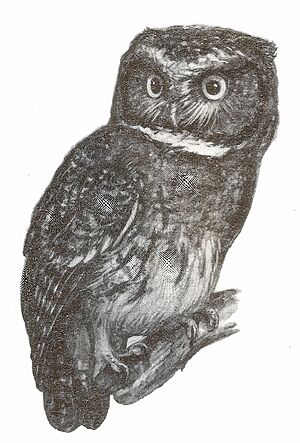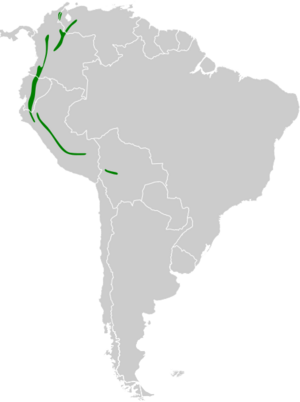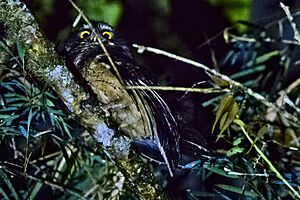White-throated screech owl facts for kids
Quick facts for kids White-throated screech owl |
|
|---|---|
 |
|
| Conservation status | |
| Scientific classification |
|
| Kingdom: | Animalia |
| Phylum: | Chordata |
| Class: | Aves |
| Order: | Strigiformes |
| Family: | Strigidae |
| Genus: | Megascops |
| Species: |
M. albogularis
|
| Binomial name | |
| Megascops albogularis (Cassin, 1849)
|
|
 |
|
| Script error: The function "autoWithCaption" does not exist. | |
| Synonyms | |
|
Otus albogularis |
|
Script error: No such module "Check for conflicting parameters".
The white-throated screech owl is a small owl. It lives in the Andes mountains. You can find it in countries like Bolivia, Colombia, Ecuador, Peru, and Venezuela. Its scientific name is Megascops albogularis.
Contents
About the White-Throated Screech Owl
Naming and Types
The white-throated screech owl was first described in 1849. An American bird expert named John Cassin gave it its first scientific name.
Scientists recognize five different types, or subspecies, of this owl:
- M. a. obscurus
- M. a. meridensis
- M. a. macabrus
- M. a. albogularis
- M. a. remotus
Sometimes, scientists are not completely sure about how these owls are related. Some studies show this owl is close to other Megascops owls. Also, one type, M. a. obscurus, might just be a different color of another type.
What It Looks Like
The white-throated screech owl is one of the larger owls in its group. It is about 20 to 26 centimeters (8 to 10 inches) long. This is about the length of a standard ruler. It weighs between 130 to 185 grams (4.6 to 6.5 ounces). That's about as much as a small can of soda.
This owl is mostly dark brown. It has a round head with tiny ear tufts. Its tail is a bit long. Adult owls have dark brown heads and backs. They have small black, red, and white marks. Their wing and tail feathers have thin, darker stripes.
They have dark circles around their orange eyes. There are whitish marks above and below their eyes. A large white area below their beak can look like a big mustache. Their chest is dark brown with light spots. Their belly is light brown with dark stripes. Young owls are pale gray. They have a black "mask" and stripes on their head and body.
Different types of these owls have slight differences:
- M. a. meridensis has a whitish forehead and eyebrows. It also has a lighter belly.
- M. a. macabrus looks like the main type. But it has finer marks on its belly.
- M. a. obscurus and M. a. remotus are darker. They are almost black on top. They have few light spots. Their chest is dark, and their belly has only faint stripes.
Where It Lives
The different types of white-throated screech owls live in specific areas:
- M. a. obscurus lives in the Serranía del Perijá mountains. This is on the border of northern Colombia and northwestern Venezuela.
- M. a. meridensis lives in the Andes mountains of western Venezuela.
- M. a. macabrus is found in Colombia's Central and Western Andes. It also lives south through Ecuador into Peru's Cajamarca area.
- M. a. albogularis lives in the eastern Andes of Colombia and Ecuador.
- M. a. remotus is found in the eastern Andes of Peru. It goes south to central Bolivia's Cochabamba area.
This owl likes to live inside and at the edges of wet, green mountain forests. It also lives in cloud forests. These are forests often covered in clouds. It can also be found in open areas with scattered trees. It usually lives at high places, between 2,000 and 3,000 meters (6,500 to 9,800 feet) high. Sometimes, it can be found as low as 1,300 meters (4,300 feet). In Peru, it can live as high as 3,700 meters (12,100 feet).
Owl Behavior
What It Eats
The white-throated screech owl is a nocturnal animal. This means it is active at night. It hunts for food in the tops of the trees. It mostly eats insects and other small creatures with many legs. It might also eat small animals with backbones.
Reproduction and Nests
We don't know much about how these owls raise their young. Most other owls in the Megascops group nest in holes in trees. But the white-throated screech owl has been seen nesting on the ground. It has also been seen using old nests built by other birds.
How It Sounds
The white-throated screech owl makes several different sounds. What is thought to be the male's main song is a rough, barking sound. It sounds like "churro-churro-churro-chu chu chu chu." It can sing this for up to a minute. Another song is even hoots, about five per second.
When a male and female owl sing together, it's called a duet. The female's voice is higher pitched. The female also makes different calls when she is upset or bothered.
Conservation Status
The IUCN (International Union for Conservation of Nature) has said the white-throated screech owl is of "Least Concern." This means it is not currently in danger of disappearing. We don't know exactly how many of these owls there are. But scientists believe their numbers are staying steady.
Multimedia
- https://search.macaulaylibrary.org/catalog?taxonCode=whtsco1 Photographs and audio recordings
 | Leon Lynch |
 | Milton P. Webster |
 | Ferdinand Smith |



